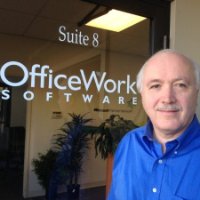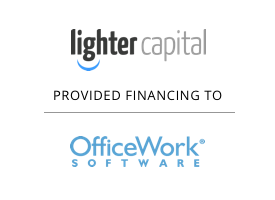
The Advisor Finder Report: Q4 2025
Welcome to the Q4 2025 issue of The Advisor Finder Report, a quarterly publication that surfaces the activity occurring on…
 When Gordon Landies invested in OfficeWork Software, a San Francisco-based H.R. intelligence solution, he knew he wasn’t interested in financing the business like a typical Silicon Valley tech company. The majority of these firms look for VC money to start up, then do several rounds of angel and VC funding. But Gordon and OfficeWork’s founder planned to finance the company with personal equity and long term debt. They wanted to avoid the complications of taking on investors during the early growth stage of the company.
When Gordon Landies invested in OfficeWork Software, a San Francisco-based H.R. intelligence solution, he knew he wasn’t interested in financing the business like a typical Silicon Valley tech company. The majority of these firms look for VC money to start up, then do several rounds of angel and VC funding. But Gordon and OfficeWork’s founder planned to finance the company with personal equity and long term debt. They wanted to avoid the complications of taking on investors during the early growth stage of the company.
OfficeWork isn’t Gordon’s first rodeo. In 1989, he sold his first software company to The Software Toolworks, the first entertainment education software company to go public. Gordon has been involved in over 20 mergers and acquisitions since then. He’s started businesses including photos.com (which eventually sold to Getty) and houseplans.com, the #1 online site for house plans.
Gordon was well aware that taking on equity early on would mean giving up control before having the chance to increase value. He wasn’t interested in the legal and accounting expenses that come with investors or in high dilution at an early stage. He knew he had the experience and resources to grow OfficeWork on his own (in part by deferring pay and using personal financing).
 For the first two years, the company was able to scale with bank term loans and loans from Landies’ venture firm. In 2014, however, Gordon was seeking long-term funding for growth capital. “We needed funding for cycles in the business, as well as for technology development, which often takes 12-16 months before revenue is realized,” says Gordon.
For the first two years, the company was able to scale with bank term loans and loans from Landies’ venture firm. In 2014, however, Gordon was seeking long-term funding for growth capital. “We needed funding for cycles in the business, as well as for technology development, which often takes 12-16 months before revenue is realized,” says Gordon.
Gordon turned to Axial for help. “Axial provided a unique array of contacts, including small VC, private equity, and alternative VC lending sources. Through Axial we were connected with Lighter Capital, which provides a unique revenue-based lending program. Within four weeks of our introduction to Lighter, we closed the first of two long-term loans, with unique terms for growing technology companies,” says Gordon.
We talked to Gordon about OfficeWork’s growth up to that point, why Lighter Capital was the right fit for his company, and his main focuses for OfficeWork moving forward.
OfficeWork’s core offering is OrgChartPro, an H.R. intelligence solution currently used by the likes of Nike, Restoration Hardware, SiriusXM, Turner Broadcasting, Subway, and more. OrgChartPro helps with change analysis, strategies around mergers and acquisitions, talent planning, headcount analysis around diversity or performance, and much more.
The company began by developing org planning software for desktop, and sold to over 10,000 customers with a variety of government, academic institutions, including the U.S. Department of Veteran’s Affairs, the U.S. Patent and Trademark Office, and universities like Syracuse, Rutgers, Boston College, and Ohio State University.
OfficeWork launched a cloud-based SaaS solution, OrgChart Now, in 2015. “We developed, created, and launched a cloud business without any capital, which is crazy when I think about it now,” Gordon says. “We’ll have over a thousand customers in the cloud by the end of 2017, and we are a leading partner with ADP in its Cloud Workforce Now platform.”
By 2014, Gordon was seeking growth funding for the business. Still averse to taking on equity, he used Axial to get a sense of the landscape of available debt offerings. “The Axial network produced quick responses from valuable contacts as soon as we joined,” Gordon says.
When he connected with Seattle-based Lighter Capital, “it was immediately clear that they were very, very different” from other lenders. “It’s literally lighter capital, with no personal guarantees. That’s a big deal, especially for people who already have money from prior ventures. They allow owners to scale without losing control. Many of Lighter’s clients are led by founders that are in their second or third venture, which was my situation.”
Lighter Capital provides revenue-based financing, focusing on long-term financing needs for early-stage B2B SaaS businesses. “We address a portion of the market which rarely sees any investment or financing outside of potential seed capital or pre-series A funding. And we do that via non-dilutive instruments which are structured as debt,” says Zach Hoene, Director of Investments at Lighter Capital. “Being able to retain equity at that early stage is definitely a huge value.”
Says Gordon, “they really get start-ups and tech companies in particular. They know how to finance a cash flow deal with start-ups, and understand that most tech companies are going to lose money at some point before crossing over to profitability.”
Repayments are based on a percentage of monthly net cash receipts. “When they have a good month, they pay us a little more; when they have a down month, they pay us less,” says Zach. “We’re in it with them, just like an equity investor would be, but our return cap is predefined as a total amount over the life of the loan. Business owners always know what they’re going to pay us; the only variable component is how quickly they pay us back.”
Gordon also liked that Lighter was flexible in working with their current balance sheet. “Our bank loans didn’t bother them at all. They were willing to take a second position behind lines of credit and term loans, which is very unusual.”
Ultimately, OfficeWork Software secured two small rounds of financing from Lighter Capital, the first in July 2015 and the second in November 2015. (Repeat financings are common for Lighter; they average about 1.7 loans per borrower across their portfolio.)
Today, OfficeWork is profitable and cash-flow positive. Gordon projects the company will grow at least a hundred percent in sales this year, while growing headcount slowly from around 30 in the U.S. and overseas this year.
“We’ll keep focusing on getting better at what we do and continuing to provide better solutions to customers,” says Gordon. Customer service is a huge emphasis for the business. “We guarantee the best service in the industry. No one will respond faster or solve a problem or give a quote faster than we do. Those are things we control, and that’s our culture.”
Hiring and retaining a team with the skillset and attitude to maintain this culture is imperative. “My goal is to make this company the best company anyone’s ever worked at.” OfficeWorks doesn’t shy away from perks: they provide 100% 401k matching and 100% mental, dental, and vision insurance. But an even bigger component of Gordon’s philosophy has to do with trust. “We give people a lot of personal flexibility, and really focus on performance and results. We encourage family life and healthy living.”
The strategy seems to be paying off: only one employee left OfficeWork last year. “We’re confident in our people — they’re smart, and they have a lot of experience — and we’re confident in our ability to deliver the best technology to our customers,” says Gordon.
